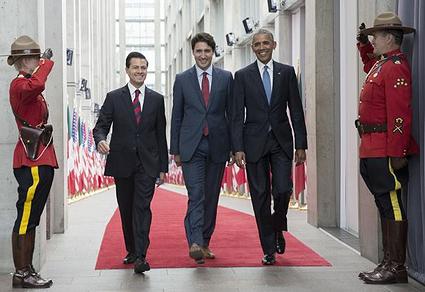
OTTAWA, Ontario, Canada, June 30, 2016 (ENS) – The leaders of the United States, Canada, and Mexico met at the North American Leaders Summit Wednesday where they set an historic goal – to generate 50 percent clean power across North America by 2025.
They intend to achieve this through a combination of renewable energy, nuclear power, power plants using carbon capture and storage, and cutting energy waste through efficiency. There will be greater cooperation on permitting new transmission lines, comittments to procure clean energy for federal facilities, and cutting waste through increased efficiency.

By forging this unprecedented partnership, President Barack Obama, Prime Minister Justin Trudeau, and President Enrique Peña Nieto underscore what was shown at the UN’s Paris Climate Agreement in December and in actions around the world – climate change is a global problem that requires a global solution.
“This is the only planet we’ve got. And this may be the last shot we’ve got to save it,” President Obama said in an address to the Canadian Parliament and the Canadian people.
The tri-national clean power agreement aims to reduce transportation emissions, including aligning light- and heavy-duty vehicle standards across the three countries. The leaders say this will drive black carbon emissions levels from new buses and trucks to near-zero across the continent.
“We recognize that fully realizing the promise of an integrated North American transportation network will require joint action that will create clean jobs while reducing energy consumption, greenhouse gases, and air pollution,” the three leaders said in their statement.
The three leaders agreed to reduce greenhouse gas emissions from light-duty vehicles by aligning fuel efficiency and/or greenhouse gas emission standards out to 2025. For and heavy-duty vehicles the target date is 2027.
They further committed to reduce air pollutant emissions by aligning air pollutant emission standards for light- and heavy-duty vehicles and corresponding ultra low-sulphur fuel standards by 2018.
In addition, the three leaders will encourage greener freight transportation throughout North America by expanding the SmartWay program to Mexico. SmartWay is a public-private initiative to reduce greenhouse gas emissions and air pollution created by freight transportation in corporate supply chains.
The three leaders committed to accelerate the deployment of clean vehicles in government fleets; and promised to work collaboratively with industry to encourage the adoption of clean vehicles by identifying initiatives to support consumer choice;
To establish North American refueling corridors for clean vehicles, the leaders agreed to encourage public and private infrastructure investments.
They agreed to align regulations, codes and standards where appropriate, and they are fostering research, development, and demonstration activities for new clean transport technologies.
“We commit to phase out inefficient fossil fuel subsidies by 2025 and call on the other members of the G-20 to do the same,” they declared.
“We also urge the G-20 to make commitments to reduce methane emissions in the oil and gas sector and to improve the environmental performance of heavy-duty vehicles.
By spring 2017, they will convene industry leaders and other stakeholders to forge a shared vision “for a competitive and clean North American automotive sector.”
In a joint statement, the three leaders said, “We recognize the significant contributions of our respective automotive industries and urge them to continue playing a leadership role in the development and deployment of clean and connected vehicles, innovating toward a shared vision of a green transportation future.”
All three countries share a committment to join the Paris Climate Agreement this year, in addition to reaching successful conclusions in other key international negotations this fall.
This includes amending the Montreal Protocol to reduce HFC emissions and limiting emissions from the aircraft sector through the International Civil Aviation Organization.
“We support the adoption by all countries in 2016 of the market-based measure proposed through the International Civil Aviation Organization to allow for carbon-neutral growth from international civil aviation from 2020 onwards and will join the first phase of the measure adopted,” the leaders said.
They announced their shared commitment to reducing greenhouse gas emissions from maritime shipping and agreed to work together and through the International Maritime Organization to support implementation of a North American Emission Control Area that includes Mexico.
Mexico is committing to cut its emissions of methane, a potent greenhouse gas. As part of the agreement, Mexico will adopt the U.S. and Canada’s ambitious goal to reduce methane emissions from the oil and gas sector by 40 to 45 percent by the year 2025.
The leaders asserted that cleaner power will help to grow their economies. The plan will support more than one million jobs over the next decade, they said, up from nearly 700,000 clean energy jobs today.
© 2016, Environment News Service. All rights reserved. Content may be quoted only with proper attribution and a direct link to the original article. Full reproduction is prohibited.
